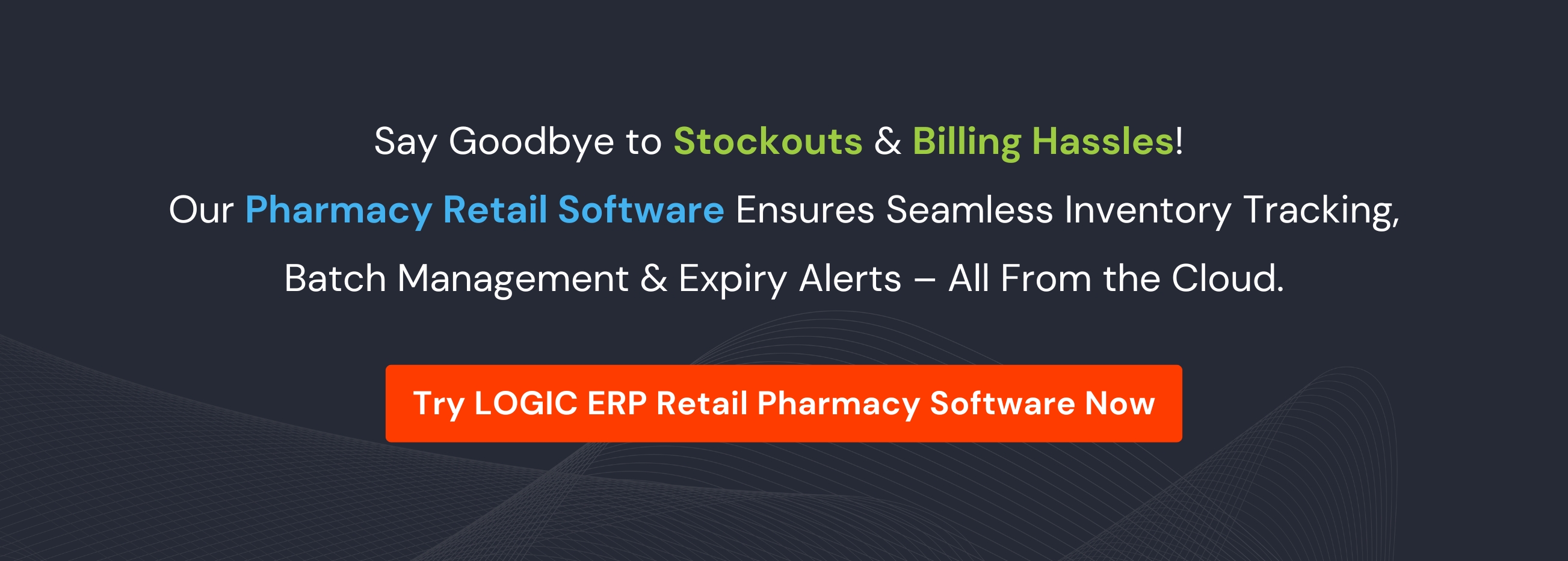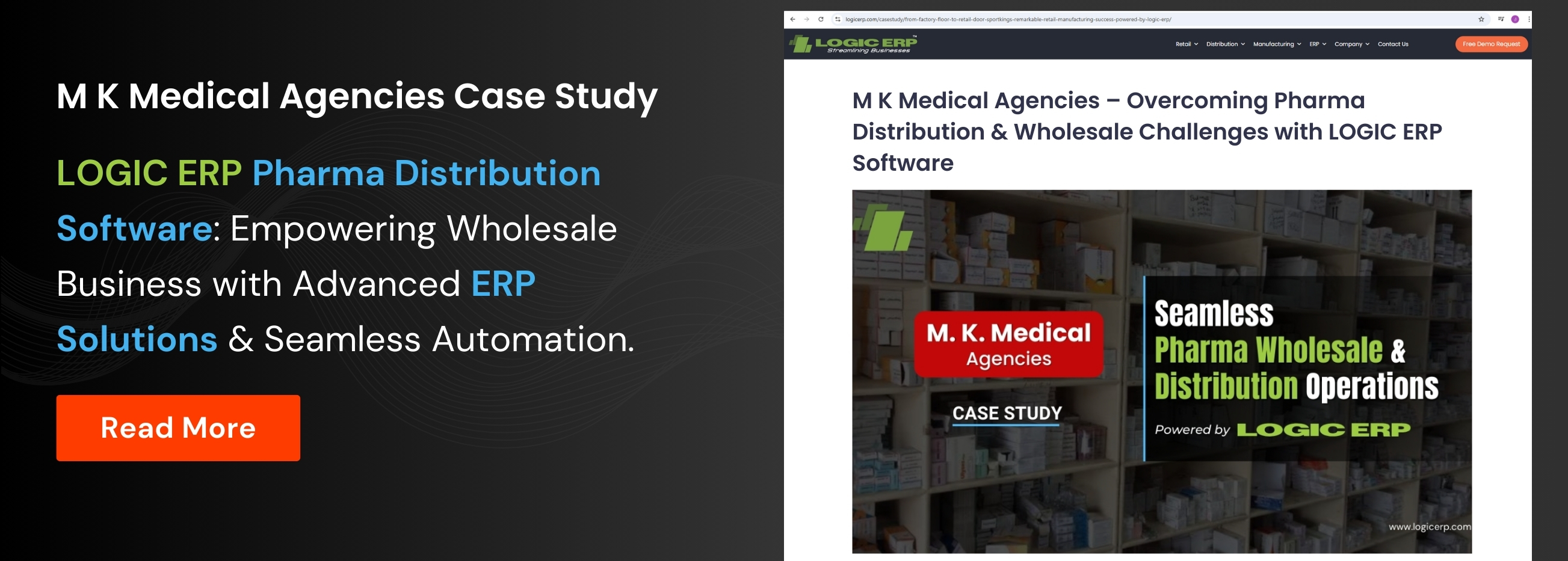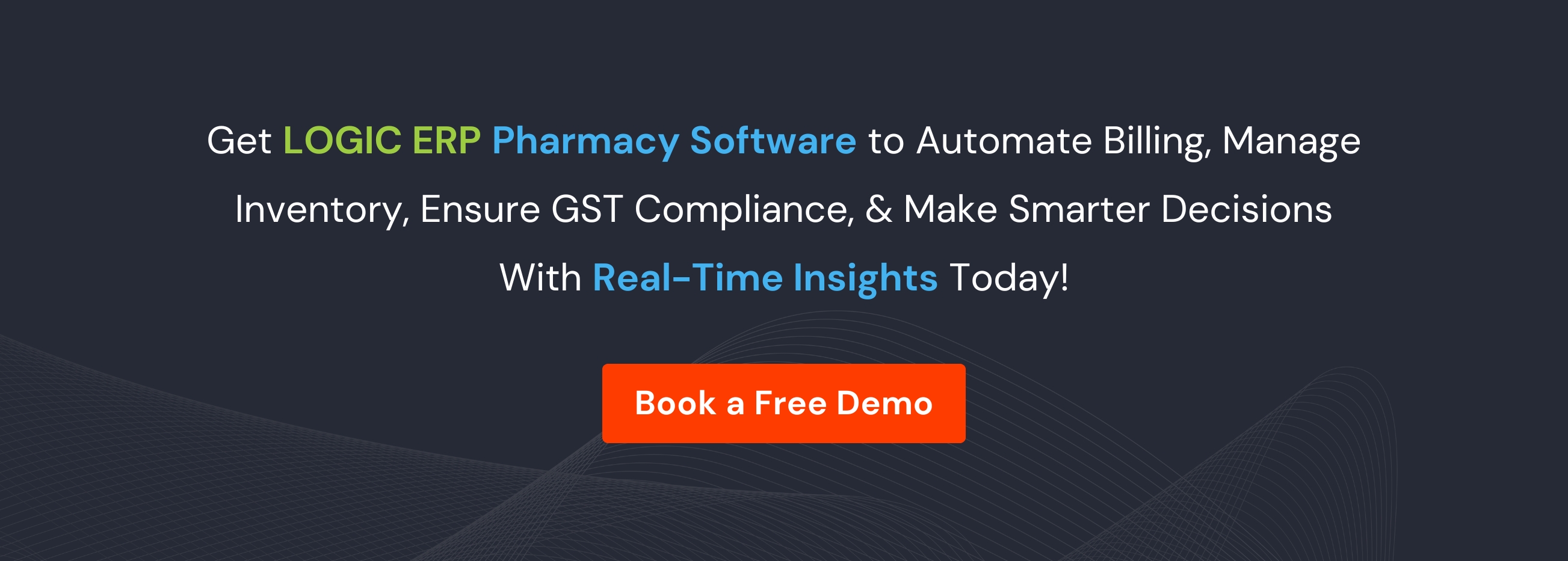What is Retail Pharmacy Software? A Complete Guide


Summary
LOGIC ERP retail pharmacy software for retail business streamlines operations by managing prescriptions, inventory, billing, compliance, and customer data. Features such as e-prescriptions, expiry alerts, real-time stock tracking, and analytics are essential for boosting efficiency, reducing errors, and enhancing customer service. Choosing the right solution depends on business size, budget, and support needs. As AI, telepharmacy, and IoT evolve, pharmacy management software is key to staying competitive and future-ready.
Key Takeaways
- Pharmacy software streamlines billing, prescription management, and inventory tracking for pharmacies.
- Pharmacy management systems reduce manual errors and boost operational efficiency in daily workflows.
- Medicine inventory software helps track stock levels, set expiry alerts, and manage reorders in real time.
- Pharmacy billing software enables fast checkouts and maintains accurate digital records.
- Customer experience in pharmacies improves with personalized service and faster response times.
- Compliance-ready pharmacy solutions ensure adherence to GST, barcode norms, and medical regulations.
- AI-powered pharmacy tools and IoT integration enable smarter decision-making and future-readiness.
Introduction
Pharmacy software for the retail industry, also known as pharmacy management system (PMS), is an all-in-one ERP software solution developed to streamline and automate pharmacy operations.
According to Research and Market statistical reports, “The Pharmacy Management System Market is expected to reach USD 101.07 billion in 2025 and grow at a CAGR of 15.47% to reach USD 207.48 billion by 2030.”
This explosive growth reflects the increasing adoption of digital solutions in pharmacy management worldwide.
What is Retail Pharmacy Software?
LOGIC ERP retail pharmacy software is an integrated platform that combines Point-of-Sale (POS), Enterprise Resource Planning (ERP), inventory management, prescription processing, and Customer Relationship Management (CRM) into a single, unified system. The best pharmacy management software enhances pharmacy operations, promotes better patient health outcomes, and helps increase long-term revenue.
Modern pharmacy software solutions offer a centralized platform to streamline prescription dispensing while delivering comprehensive business management capabilities for independent pharmacies, pharmacy chains, and healthcare facilities.
Core Features of Pharmacy Management Software
1. Prescription Processing and Dispensing
- Electronic prescription (e-prescribing) integration
- Drug interaction checking and clinical decision support
- Insurance claim processing and adjudication
- Prescription history tracking and refill management
- Automated dosage calculations and labeling
2. Inventory Management
- Real-time stock tracking and automated reordering
- Expiry date monitoring and batch tracking
- Supplier management and purchase order automation
- Drug recall management and tracking
- Cost analysis and profit margin optimization
3. Point of Sale (POS) Integration
- Multi-payment processing (cash, card, insurance)
- Receipt generation and tax management
- Customer loyalty programs integration
- Over-the-counter (OTC) product sales management
- Barcode scanning and RFID technology support
4. Customer Relationship Management (CRM)
- Patient profile management and medication history
- Automated refill reminders and notifications
- Customer communication tools (SMS, email alerts)
- Consultation scheduling and appointment management
- Patient counseling documentation
5. Regulatory Compliance and Reporting
- State and federal compliance management
- Audit trail maintenance and documentation
- Insurance billing and claims reporting
- Financial reporting and analytics
Benefits of Retail ERP Pharmacy Software
Operational Efficiency
Pharmacy management systems significantly reduce manual processes, minimize human errors, and streamline workflow operations. Automated features like prescription processing, inventory management, and billing can save hours of daily administrative work.
Enhanced Patient Safety
Clinical decision support systems within pharmacy software help prevent dangerous drug interactions, dosage errors, and prescription mistakes. Real-time alerts and comprehensive medication history reviews ensure optimal patient care.
Improved Profitability
Advanced analytics and reporting features help pharmacy owners identify profitable products, optimize inventory levels, and reduce waste. Cost tracking and supplier management tools contribute to better financial performance.
Regulatory Compliance
Built-in compliance features ensure adherence to NCB regulations, state pharmacy laws, and insurance requirements. Automated reporting capabilities simplify audit processes and reduce compliance risks.
Better Customer Service
Integrated CRM features enable personalized customer service, automated refill reminders, and efficient prescription management. Mobile apps and online portals enhance customer convenience and satisfaction.
Key Components of Modern Pharmacy Software
Cloud-Based Architecture
Modern solutions offer cloud-based deployment options, providing scalability, remote access, and automatic updates. This eliminates the need for extensive IT infrastructure and reduces maintenance costs.
Mobile Integration
Mobile applications for both pharmacists and customers enable prescription management, inventory checks, and customer communication on-the-go. This flexibility improves operational efficiency and customer engagement.
Analytics and Business Intelligence
Advanced reporting tools provide insights into sales trends, inventory turnover, customer behavior, and financial performance. Data-driven decision making becomes possible with comprehensive analytics dashboards.
Integration Capabilities
Modern pharmacy software integrates with electronic health records (EHR), insurance networks, supplier systems, and third-party applications. This seamless connectivity eliminates data silos and improves workflow efficiency.
Choosing the Right Pharmacy Management System
Factors to Consider
1. Business Size and Type
- Independent pharmacy vs. chain operations
- Volume of prescriptions processed daily
- Number of locations and staff members
- Specialty pharmacy requirements
2. Feature Requirements
- Essential vs. advanced features needed
- Integration requirements with existing systems
- Scalability for future growth
- Customization capabilities
3. Budget and ROI
- Initial implementation costs
- Ongoing subscription or licensing fees
- Training and support costs
- Expected return on investment timeline
4. Vendor Support and Training
- Implementation support and timeline
- Ongoing technical support availability
- Training programs for staff
- Software updates and maintenance
The Best Practices of Pharmacy Software Implementation
Pre-Implementation Planning
- Conduct thorough needs assessment
- Define clear objectives and success metrics
- Prepare data migration strategies
- Plan staff training schedules
Data Migration and Setup
- Ensure accurate data transfer from legacy systems
- Configure system settings according to business requirements
- Set up user roles and permissions
- Test all integrations thoroughly
Staff Training and Change Management
- Provide comprehensive training programs
- Create user manuals and documentation
- Establish ongoing support procedures
- Monitor adoption and address resistance
Go-Live and Post-Implementation
- Execute phased rollout strategy
- Monitor system performance closely
- Gather user feedback and make adjustments
- Schedule regular system reviews and optimizations
Future Trends in Pharmacy Software
Artificial Intelligence and Machine Learning
AI-powered features are becoming increasingly common, including predictive analytics for inventory management, personalized medication recommendations, and automated clinical decision support.
Telepharmacy Integration
Remote pharmacy services and virtual consultations are growing rapidly, requiring software solutions that support telepharmacy operations and remote prescription dispensing.
Blockchain Technology
Blockchain applications in pharmacy software focus on supply chain transparency, drug authentication, and secure patient data management.
IoT and Automation
Internet of Things (IoT) devices and robotic dispensing systems are being integrated with pharmacy software to automate medication dispensing and inventory management.
LOGIC ERP: A Complete Pharmacy Management Solution
LOGIC ERP represents the next generation of retail pharmacy software, offering pharmacy management features with advanced ERP capabilities. As a comprehensive business management platform, LOGIC ERP offers:
- Integrated POS and inventory management
- Advanced reporting and analytics
- Multi-location support for pharmacy chains
- Cloud-based accessibility and mobile integration
- Comprehensive compliance and regulatory features
- Scalable architecture for growing businesses
The platform’s user-friendly interface and robust functionality make it an ideal choice for pharmacies looking to modernize their operations and improve overall efficiency.
ROI and Cost Considerations
Typical ROI Timeline
Most pharmacies see return on investment within 12-18 months of implementing comprehensive pharmacy management software. Key ROI drivers include:
- Reduced labor costs through automation
- Improved inventory turnover and reduced waste
- Enhanced customer retention and satisfaction
- Better insurance claim processing and fewer rejections
- Improved regulatory compliance and reduced penalties
Cost Structure
Pharmacy software costs typically include:
- Initial licensing or setup fees
- Monthly or annual subscription costs
- Implementation and training expenses
- Ongoing support and maintenance fees
- Hardware requirements and upgrades
Success Stories from the Pharmacy Industry
Read Case Study: M K Medical Agencies — Overcoming Pharma Distribution & Wholesale Challenges with LOGIC ERP Software
Conclusion
Retail pharmacy software has become an integral part of modern healthcare, helping streamline business operations and providing the technological foundation needed to compete in today’s healthcare marketplace. Successful implementation depends on selecting a solution that aligns with your specific business needs, followed by proper planning, comprehensive training, and continuous optimization. As the industry evolves with new technologies and regulatory changes, having a robust and scalable pharmacy management system ensures your business can adapt and thrive in the competitive retail pharmacy landscape. Whether you’re an independent pharmacy aiming to improve efficiency or a chain operation looking to standardize processes across multiple locations, modern pharmacy software delivers the insights and capabilities needed to provide exceptional patient care while maintaining profitability.
If you are looking for the best pharmacy software for your retail business, contact LOGIC ERP experts at +91-73411-41176 or send us an email at sales@logicerp.com today!
Frequently Asked Questions (FAQs)
What does retail pharmacy software do?
Retail pharmacy software automates and manages all aspects of pharmacy operations including prescription processing, inventory management, point-of-sale transactions, insurance billing, patient records, and regulatory compliance. The software streamlines workflow, reduces errors, and improves overall pharmacy efficiency while ensuring patient safety and regulatory adherence.
What is the difference between pharmacy software and ERP systems?
Pharmacy software focuses specifically on pharmacy operations like prescription dispensing and drug inventory management, while ERP systems like LOGIC ERP provide comprehensive business management including accounting, HR, customer management, and multi-location operations. Modern solutions combine both, offering specialized pharmacy features within a complete business management platform.
Do I need pharmacy software for a small independent pharmacy?
Yes, even small independent pharmacies benefit significantly from pharmacy management software. Key advantages include automated prescription processing, inventory tracking, insurance claim processing, and regulatory compliance management. Software helps small pharmacies compete with larger chains by improving efficiency and reducing operational costs.
What are the must-have features in pharmacy software?
Essential pharmacy software features include prescription processing and e-prescribing integration, real-time inventory management, POS system integration, insurance billing and claims processing, patient profile management, drug interaction checking, regulatory compliance reporting, and automated refill reminders. Advanced features include analytics, mobile access, and multi-location support.
How long does it take to implement pharmacy management software?
Pharmacy software implementation typically takes 2-6 weeks depending on system complexity and data migration requirements. The process includes data transfer from existing systems, staff training, system configuration, and testing. Cloud-based solutions like LOGIC ERP often have faster implementation timelines compared to on-premise systems.
Is pharmacy software HIPAA compliant?
Reputable pharmacy software solutions are designed to be HIPAA compliant, featuring encrypted data storage, secure user authentication, audit trails, and access controls. When evaluating software, verify HIPAA compliance certification and ask about security measures, data backup procedures, and breach notification protocols.
Can pharmacy software integrate with electronic health records (EHR)?
Yes, modern pharmacy management systems integrate seamlessly with EHR systems, enabling real-time prescription data sharing, medication history access, and clinical decision support. This integration improves patient care coordination and reduces medication errors by providing healthcare providers with comprehensive patient information.
What is cloud-based pharmacy software?
Cloud-based pharmacy software operates on remote servers accessed via the internet, eliminating the need for local server hardware. Benefits include automatic updates, remote access capability, reduced IT maintenance costs, enhanced data security, and scalability. Cloud solutions typically offer better disaster recovery and data backup compared to on-premise systems.
How does pharmacy software help with inventory management?
Pharmacy software provides real-time inventory tracking, automated reorder points, expiration date monitoring, supplier management, and cost analysis. Advanced features include predictive analytics for demand forecasting, automated purchase orders, batch tracking for recalls, and integration with supplier systems for streamlined ordering processes.
What training is required for pharmacy software?
Pharmacy software training typically includes basic system navigation, prescription processing workflows, inventory management procedures, POS operations, and reporting functions. Most vendors provide comprehensive training programs lasting 1-3 days, along with ongoing support and user manuals. Staff adaptation usually takes 1-2 weeks for full proficiency.
Can pharmacy software handle multiple locations?
Yes, enterprise pharmacy software solutions like LOGIC ERP support multi-location operations with centralized management, unified reporting, inventory transfers between locations, and standardized workflows. Features include location-specific user permissions, consolidated financial reporting, and real-time visibility across all pharmacy locations.
What reports can pharmacy software generate?
Pharmacy software generates comprehensive reports including sales analytics, inventory turnover reports, prescription volume statistics, insurance reimbursement summaries, patient medication histories, regulatory compliance reports, financial performance dashboards, and controlled substance tracking. Custom reporting capabilities allow tailored business intelligence insights.
How secure is pharmacy management software?
Modern pharmacy software employs multiple security layers including data encryption, secure user authentication, role-based access controls, audit trails, and regular security updates. Cloud-based solutions often provide enhanced security through professional data centers, automated backups, and 24/7 monitoring that exceeds typical pharmacy IT capabilities.
Can pharmacy software help with regulatory compliance?
Yes, pharmacy software automates regulatory compliance including DEA reporting for controlled substances, state board requirements, insurance audits, and FDA recalls. Built-in compliance features include automated record keeping, audit trail maintenance, expiration date tracking, and standardized documentation procedures that simplify regulatory inspections.
What mobile features do pharmacy software solutions offer?
Modern pharmacy software includes mobile applications for prescription management, inventory checking, customer notifications, and remote system access. Mobile features enable pharmacists to process prescriptions, check drug interactions, manage customer communications, and access reports from anywhere, improving operational flexibility and customer service.
How does pharmacy software improve patient safety?
Pharmacy software enhances patient safety through drug interaction checking, allergy alerts, dosage verification, duplicate prescription detection, and comprehensive medication history tracking. Clinical decision support systems provide real-time warnings about potential medication problems, significantly reducing dispensing errors and adverse drug reactions.
What support is available for pharmacy software users?
Pharmacy software vendors typically provide multiple support channels including phone support, email assistance, online chat, knowledge bases, video tutorials, and user communities. Premium support packages may include dedicated account managers, priority response times, and on-site assistance. Training programs and certification courses are often available for advanced users.
How can I get a free pharmacy software demo?
Contact our experts at +91-73411-41176 or send us an email at sales@logicerp.com to book a free demo today!

Author
Swarndeep IS Guram
Co-founder & CEO | LOGIC ERP Solutions Pvt. Ltd.
With a passion for driving digital transformation, I specialize in helping retail, distribution, and manufacturing businesses streamline operations and scale efficiently through innovative ERP solutions. At LOGIC ERP, I’m committed to empowering organizations with technology that delivers real impact.




